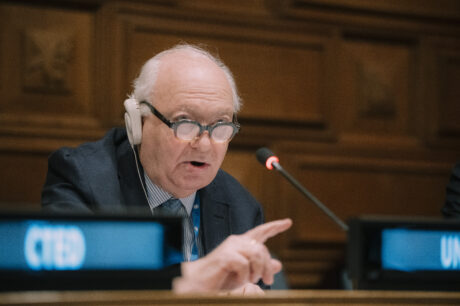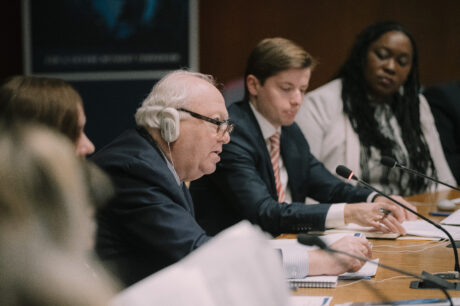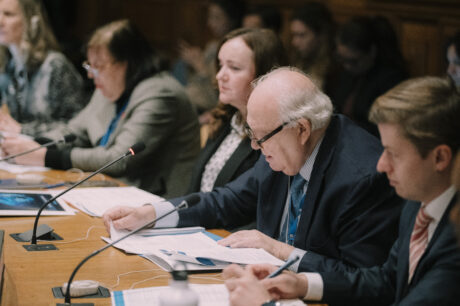Remarks by Under-Secretary-General Miguel Ángel Moratinos,
the High Representative for UNAOC, at the
11th UN Global Counter-Terrorism Compact Coordination Committee Meeting
5 February 2025, New York
Your Excellency, Under-Secretary-General Vladimir Voronkov;
Your Excellency, Under-Secretary-General Guy Ryder;
Thank you for inviting me to this meeting.
This is the second month of 2025.
Although 2024 was pretty much overwhelming for most of us considering the turmoil around the world and a very complex geopolitical context, there is a reason to be hopeful.
At the outset, I wish to underline that the path to a future where peace and security, human rights and sustainable development prevails does not necessarily mean the absence of wars, violent and armed conflicts. This would be a narrow perception of what peace is. Peace is to be perceived as a process in which the absence of wars , conflicts and violence is the beginning of a path towards sustainable peace.
Today, as we reflect on the vision laid out in the Pact for the Future, it is clear that building inclusive and peaceful societies cannot be achieved by governments or institutions alone. There is no alternative for an All-of-Society Approach to ensure a better and nuanced understanding of the root causes of conflicts and violent extremism otherwise we will be operating in a vacuum. Therefore, we must recognize the importance of the meaningful participation of grassroots organizations, marginalized communities, and other vulnerable groups. It is only by ensuring that all voices are heard that we can achieve sustainable peace.
The Pact for the Future calls on all of us to strengthen multilateralism, defend human rights, and champion the values of peace, justice, and inclusion. It recognizes that to achieve the Sustainable Development Goals, we must focus on fostering social cohesion and addressing the deep-rooted causes of division within and among our societies. These are in a nutshell key antidotes to conflicts and violence.
We were very encouraged that the Pact includes several references that are aligned with UNAOC mandate and priorities namely under action 11(c), 13(b), 18(c), 35(b), in addition to Actions 23 (a) and (b). These action points references sustaining peace, building inclusive and just societies, addressing the root causes of conflicts and drivers of terrorism combating racism, racial discrimination, religious intolerance and promoting intercultural and interreligious dialogue.
In this context, we will continue to articulate the core message and mission of UNAOC that amplifies dialogue and mediation as preventive tools, and emphasize that securitized responses have proven insufficient at best or counter-productive at worst, unless accompanied by holistic preventive approaches, including more investment in community resilience to mitigate individual radicalization.
Last September, I convened a High-level Ministerial meeting of the UNAOC Group of Friends, in which I presented the UNAOC Action Plan 2024-2026. Informed by the Pact for the Future, on-going and new action points were presented across UNAOC’s main pillars — youth, education, media, migration and women as peacemakers.
To be more specific:
- In line with Action 23(a), which calls for a whole-of-society approach to addressing the drivers of terrorism, UNAOC implements youth-focused and community-based programmes that foster resilience against violent extremist narratives (conducive to terrorism). Three programing activities correspond to that action point:
- The Young Peacebuilders Programme (YPB) empowers young leaders with conflict resolution, dialogue, and media literacy skills, enabling them to implement PCVE efforts at the grassroots level. Additionally, YPB is in line with Action 20, 34 and 36 of the Pact, calling for accelerating the implementation of the YPS agenda and meaningful engagement of youth at all levels.
- Our Youth Solidarity Fund (YSF), provides a trusted mechanism to invest in youth-led efforts that are responsive to community needs.
- Recognizing the threat posed by the misuse of digital technologies for terrorist purposes Action 23(b), UNAOC has been working on exposing younger generations to media literacy to help them acquire skills to create counter-narratives against hate and intolerance and develop innovative techniques to create compelling content that promotes positive values and responds to misrepresentations of facts. We have two ongoing programs:
- PLURAL+, an initiative of UNAOC and IOM, we empower young creators to counter violent narratives through digital storytelling.
- “Les Medias C’est Nous”, in partnership with the municipality of La Courneuve, promotes social cohesion in vulnerable communities by equipping young people with media literacy and critical thinking skills and responsible digital engagement capacity building.
- In line with Action 11(c) , which underlines the necessity to promote intercultural and interreligious dialogue to strengthen social cohesion and Action 23 , we continue to strengthen our outreach to grassroots organizations through the Intercultural Innovation Hub (IIH), an initiative in collaboration with the private sector the BMW Group with the support of Accenture.
- Last but not least, in line with Action 18(c) on combating racism and eliminating racial discrimination, xenophobia and religious intolerance and all other forms of intolerance and discrimination from our societies and promote interreligious and intercultural dialogue.
We firmly believe that the root causes of religious intolerance, hate crimes, including verbal and physical attacks on persons based on their religion or belief, or their places of worship and their sacred sites, must be addressed.
To operationalize this, the following action points will be taken:
- Addressing Antisemitism:
As most of you might be aware, on January 17, I launched the UN Action Plan to Enhance Monitoring and Response to Antisemitism. The Action Plan, guided by the Secretary-General , is the sum of efforts spanning over the past months in coordination with several United Nations entities and other stakeholders including major Jewish organizations. This Action Plan focused on the United Nations aims to ensure an even more coordinated and effective response to counter antisemitism. - Addressing Islamophobia:
UNAOC will continue to speak out against Islamophobic incidents and Strengthen collaboration and consultation with UN relevant entities, intergovernmental organizations, regional organizations and international organizations with the aim to contribute to the implementation of the UN General Assembly Resolution “Measures to Combat Islamophobia”.
In the pipeline during 2025, I plan to launch a dialogue series entitled, “Let the Dialogues Begin” — a platform that will provide an opportunity for transparent and constructive dialogue among state and non-state actors, including religious leaders, NGOs and FBOs, on the root causes of religious bigotry and intolerance across the faith spectrum. This dialogue series is intended to tailored discussions on all major religions and faiths.
I will stop here…
I thank you.



